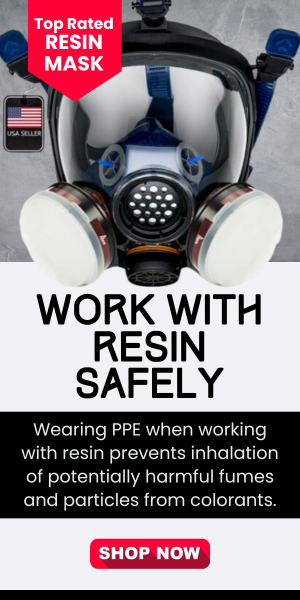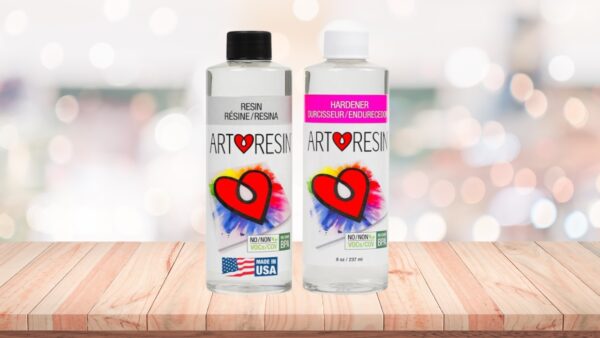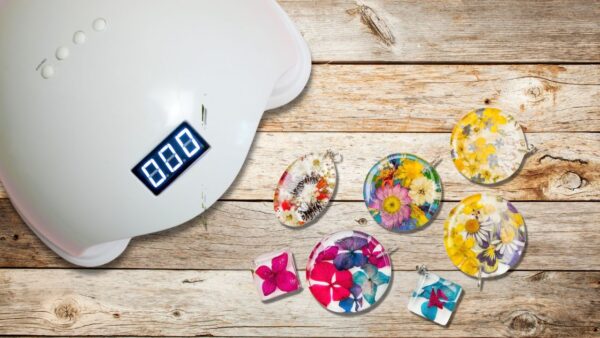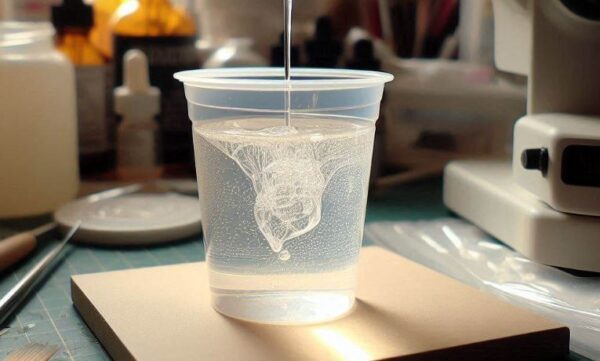The Best Epoxy Resin Respirator Mask 2025
Here is the respirator mask I use for working with epoxy resin and UV resin. The other day I answered a question, can you use epoxy resin without a mask? The answer is, you should always use a resin mask.
Working with resin can be a rewarding and fun, but it’s important to prioritize resin safety. I’ll talk about the best respirator to use when working with UV resin and epoxy resin. This is the mask that is used for resin pouring when I’m working with resin.
In this article, I’ll break down why using a respirator is must when dealing with resin. This is so that you can enjoy your craft without compromising your health.

Let’s learn about the basics you need to know about the best resin respirators and go over questions about the best respirator for working with resin.
Why Do I Need A Respirator When Working With Resin?
You may be wondering a very common question: Do you need a respirator for resin? The answer is yes. A respirator is a must-have when working with epoxy for one simple reason – your health.
Resins often contain volatile organic compounds (VOCs) and other potentially harmful substances that can be released into the air during the curing process.

Inhaling these fumes can lead to respiratory irritation, headaches, and in some cases, more serious health issues. Inhaling glitter is also very bad for your lungs. And when people use resin, they are also sometimes using a lot of glitter too.
A respirator acts as a barrier, preventing you from breathing in these harmful particles. It also helps so that the little particles of glitter aren’t getting into your lungs. Whenever I use glitter or resin, I have respirator on. I use the mask from Parcil Safety.
Resin Respirator Mask I Use
Parcil Safety Full Face Resin Mask
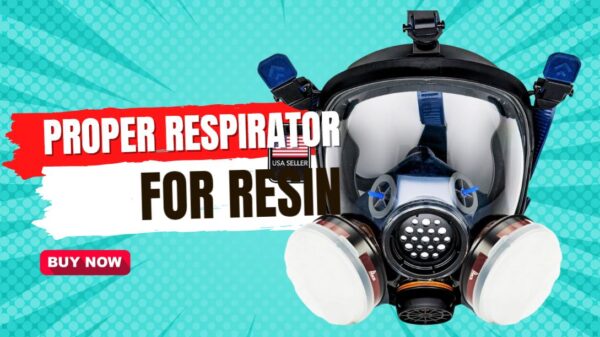
Why I Use this respirator mask
The PD100 respirator from Parcil Safety is one of the most popular resin masks to use.
This epoxy resin respirator has the proper filters. They mention it gives both particle and vapor protection. So I use it with epoxy resin, uv resin and deep pour casting resin.
Its adjustable straps and padded nose bridge give a secure and comfortable fit, which helps for extended periods of use. When I use for a long period of time, it does leave marks on my face but they go away after a while. I haven’t found a mask that won’t leave marks yet. if I do, I’ll update this article.
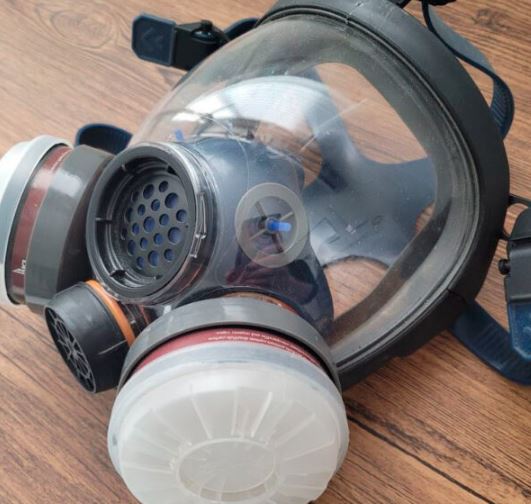
The PD100 is not only reusable, with replaceable filters for cost-effectiveness, but also has a durable construction, making it a long-lasting investment for health-conscious crafters. I’ve had mine for about 4 years.
With its focus on practicality, comfort, and robust protection, the PD100 respirator is the one I use when I’m pouring resin and curing UV resin.
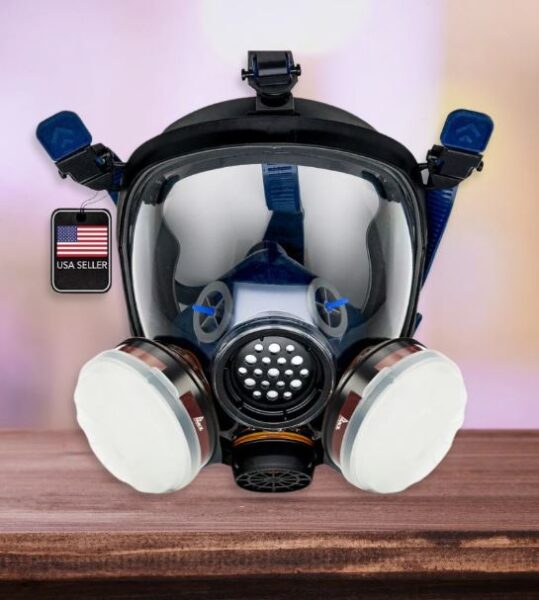
Tips For Choosing The Proper Respirator For Resin
1. Choose the Right Type
When selecting a respirator for resin pouring, you will need a respirator with both particle and vapor protection. Look for masks labeled as N95, N99, or N100, which has protection against airborne particles. It should also have activated carbon filters to trap resin vapors.
2. Check the Fit
A proper fit is important so that there are no leaks. Make sure that it’s tight around your nose and mouth without any gaps. Masks with adjustable straps or those that come in different sizes will help you find the right fit for your face.
3. Consider Comfort
Comfort matters, especially if you’ll be wearing the mask for extended periods. Look for masks with adjustable straps for a snug yet comfortable fit. Also, know that every mask is going to eventually leave some lines on your face when you are wearing it for a while. That’s just part of using resin.
4. Check Filter Lifespan
Understand the lifespan of the filters in the respirator. Some masks come with replaceable filters, and knowing when to replace them is important. Keeping spare filters on hand is a good practice to make sure you’re always working with a properly functioning mask.
5. Prioritize Reusability
Reusable masks are not only cost-effective but also more sustainable. Get for a mask that allows you to change filters rather than throwing it away after a single use. This not only saves money in the long run but is also better for the environment.

This Full Faced Respirator Covers These Important Details When Working With Resin
1 Full Face Respirator
2 Protects eyes, face, nose, mouth and airways
3 Specifically designed for DIYers, resin artists, and at-home crafting use
4 Use for organic vapors and 95% of particulates down to 0.3 microns
5 Comfortable and snug fitting on smaller heads
6 Soft natural rubber for an airtight seal
7 Comes with two carbon filters
8 Anti-fog so it remains clear while you are working
FAQ’s About Choosing A Proper Resin respirator
Why do I need a respirator for working with epoxy resin?
Using a respirator is a must because resin often contains harmful fumes, including volatile organic compounds (VOCs). Inhaling these fumes can lead to health issues, and a respirator acts as a protective barrier.
But the resin I use says non-toxic. Do I still need a mask?
Even if the resin you use is labeled as “non-toxic,” it’s still advisable to use a respirator when working with it. “Non-toxic” doesn’t necessarily mean that the fumes produced during the resin curing process are harmless to inhale.
Resins often contain volatile organic compounds (VOCs) and other chemicals that, while not immediately toxic, can still cause respiratory irritation and discomfort.
It’s a proactive measure to safeguard your respiratory health, regardless of the non-toxic label on the resin. Always prioritize your safety and well-being when working with any crafting materials.
See these guides: Is Resin Toxic? & Is Epoxy Resin Food Safe?

What types of respirators are suitable for working with resin?
Look for respirators labeled N95, N99, or N100 with activated carbon filters. These provide protection against both airborne particles and resin vapors.
How do I make sure I have a proper fit for my respirator?
A proper fit is a must. Choose a mask with adjustable straps and a nose bridge, and keep it snug on your face so that it forms a tight seal on your face without any gaps.
The mask below has straps that you pull to make sure you get a snug fit.
How often should I replace the filters in my respirator?
The frequency of filter replacement depends on the type of respirator and the intensity of resin work. Follow the manufacturer’s guidelines, and consider keeping spare filters on hand.
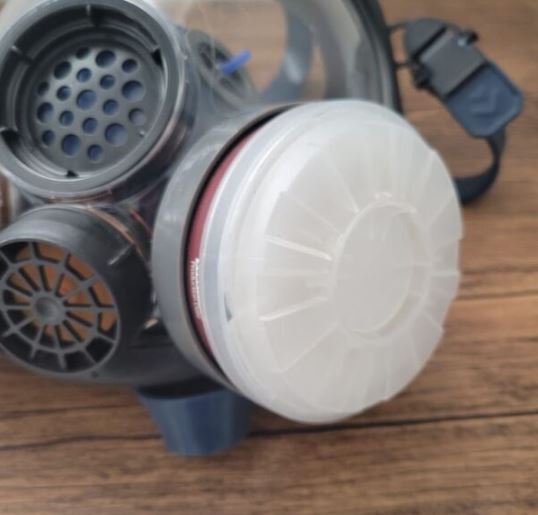
Can I use a disposable mask instead of a respirator for resin work?
While disposable masks provide some level of protection, a respirator with both particle and vapor protection is recommended for safety during resin work.
Is it necessary to wear a respirator even if I work in a well-ventilated area?
Yes, wearing a respirator is still necessary even in well-ventilated spaces. Ventilation may not be enough to completely get rid of harmful fumes, and a respirator adds an extra layer of protection for your health.
Is non toxic resin, like ArtResin ok to use without a mask?
On this blog I never recommend using any type of epoxy resin without a proper mask.
Thank you for taking the time to learn about masks to use for resin.
What mask do you use for resin? If you have any mask suggestions, feel free to leave your comment. Happy crafting, and stay safe!
